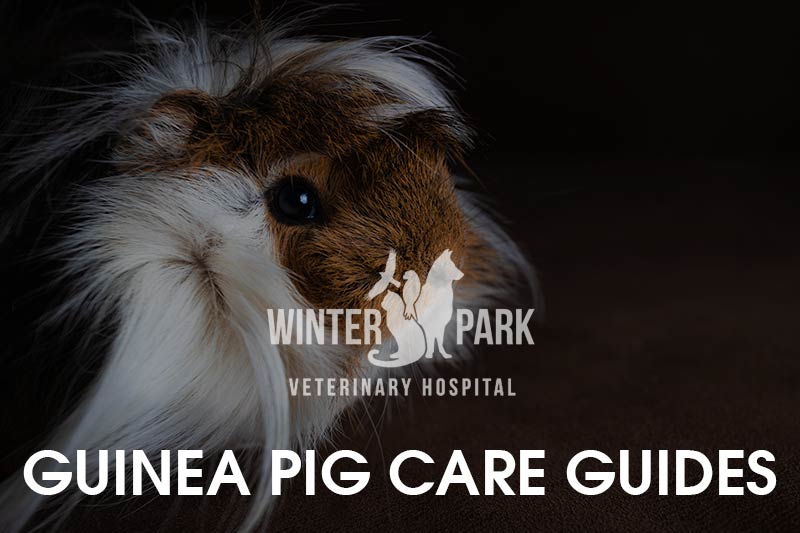Download Guinea Pig Care Guide – PDF
Guinea pigs, like rabbits, have very specific dietary needs that if not met, can lead to many illnesses such as gastrointestinal stasis, bacterial overgrowth in the intestines, diarrhea, obesity, and dental disease. Unlike rabbits, guinea pigs develop dietary preferences early in life and have difficulty adapting to changes in type, appearance, or even presentation of their food or water. A small change like switching pellet brands can cause a guinea pig to refuse to eat! Because of this, it is important to expose guinea pigs to small amounts of different pellets, hays, and vegetables when they are young so they are used to variety. Guinea pigs, like humans, cannot synthesize their own vitamin C, so they require dietary sources daily.
HAY
A constant supply of good quality hay must be available 24 hours a day. It has been documented that plenty of roughage, especially hay, will reduce problems with dental disease and gastrointestinal stasis, which can be deadly to guinea pigs. If you want your guinea pig to live to his or her full life expectancy of 5-6 years, you must provide hay. Alfalfa hay may be fed until the guinea pig is 6 months old; after that age you should switch to timothy hay or a grass hay such as Orchard grass, Botanical hay, Meadow hay, or Oat hay. 75% of your guinea pig’s diet should be hay.
FRESH VEGETABLES
Feed a variety of fresh vegetables and greens daily. This is an important way for guinea pigs to get enough vitamin C in their diet. About ½-1 cup can be offered every 24 hours. If your guinea pig has not had fresh greens or vegetables before, introduce them very slowly and only one to two at a time to avoid diarrhea. Always offer dark/tough green leafy vegetables (high in vitamin C!), along with a few other choices. See the Guinea Pig Food Shopping List for suggestions. Warning! Many types of leafy greens are high in vitamin C, but are also high in calcium and/or oxalates which can lead to urinary issues such as bladder stones. You can offer these, but offer only in small amounts: Kale, parsley, beet greens, chicory, and spinach.
FRESH FRUITS
Guinea pigs should be given a small amount of fresh fruit daily. Do not give too much as high sugar content can cause gastrointestinal disorders. Stick to no more than one tablespoon on fruits not given a specific amount. Many fruits have a good level of vitamin C as well! See the Guinea Pig Food Shopping List for suggestions.
PELLETS
Guinea pigs should be fed fresh, good quality guinea pig Timothy pellets. If you switch from one brand of pellet to another, do it gradually keeping the guinea pig’s difficulty with change in mind. Guinea pig pellets have added vitamin C, but vitamin C breaks down when exposed to air, moisture, and high environmental temperatures. Because of this, guinea pig pellets must be used within 90 days of production to guarantee enough daily vitamin C. Many pet supply stores keep food in their warehouses for many months prior to placing on their shelves, so the vitamin C is drastically reduced. Check the production date and the best by/expiration date before purchasing, and purchase only enough for a 6-week supply.
Do NOT purchase a feed that is medicated (popular with breeders) or supplemented with bits of dried fruit and seed – it is VERY high in sugar and fat. Pellets (Juvenile guinea pig formula – has alfalfa) should be available at unlimited amounts 24 hours a day for guinea pigs less than 6 months old. After 6 months of age, pellets should be reduced to 1/8 cup per 2 pounds of body weight and should be timothy pellets only. Hay must still be the majority of their diet!
WATER
Fresh water should be available at all times. Change bowls and/or bottles at least once a day even if they are not totally empty. Wash bowls and bottles frequently to remove any buildup of hard water residue, mildew, food particles, or bacteria. You may add Vitamin C to the water, but it is not recommended. Vitamin C is not stable when exposed to oxygen and therefore must be added to fresh water daily. Also, some guinea pigs do not like the taste of Vitamin C spiked water so offer plain water and give them a healthy helping of Vitamin C packed veggies/fruit every day instead!
FORBIDDEN FOODS
Most treats sold commercially have little nutritional value. One thing to avoid is sugar, as it increases the bad bacteria in a guinea pig’s intestines and can cause disease resulting in diarrhea and loss of appetite. See the Guinea Pig Food Shopping List for these foods to avoid.








